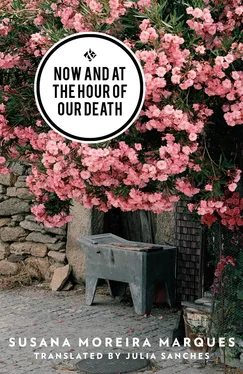Susana Moreira Marques
Now and at the Hour of Our Death
In 2009, the Calouste Gulbenkian Foundation launched a home palliative care project in the Planalto Mirandês, in Trás-os-Montes, a remote region in the north-east of Portugal.
A doctor, nurses, and other healthcare professionals travel from village to village helping dozens of patients of varying age, social class, and family circumstances to live the end of their lives in as much comfort as possible, and to die in company, at home.
This book is the result of several visits to this project and to these people, which all took place between June and October 2011.
Travel Notes about Death
Does the road wind up-hill all the way?
Yes, to the very end.
CHRISTINA ROSSETTI, ‘Up-hill’
And Death is an eagle
whose cries no one describes.
CECÍLIA MEIRELES, ‘Posthumous Song’
There are things that can’t be written about as they have been in the past. Something changes. First the eyes, then the heart — or senses, or whatever our ancestors called the soul — and, finally, the hands.
*
The first notes I take are about a man who was born, grew up, worked, was married, had a daughter, grew old, and died in the same village. These notes are not actually about the man, or his life, but about his death. They go like this:
Life in this house and with this family takes place entirely in this ground-level room, which is pleasingly dark and cool, and where there is a stove, a large table, an escanho — a long wooden bench common to Trás-os-Montes — and a door that leads to the pantry where they keep their produce.
It was April, the fireplace was not lit, but it was beside the fireplace that the man would often tell stories and where, all of a sudden full of life, he told stories that night. He said goodbye to his family — his daughter and granddaughter had come from the city. He said goodnight. He reminded the woman he’d been married to for sixty years to take her medicine.
The village where the man was born, grew up, worked, was married, had a daughter, grew old, and died is quaint, with its sculpted cross and renovated stone houses. It is tidy, clean. Quiet and very empty. It resembles a museum.
The widow, black shawl and unreadable face, moves slowly, bent by arthritis. She walks the streets like a shadow. She knows she is living the end of an era, of a way of life. When we are all gone, she says — meaning the old people — the shadows, the deserted houses will fall, slowly, and there will no longer be a village.
*
‘We have a great history, the best weather in the world, and the best people in the world,’ says a listener on the radio. ‘We will raise our country up.’
The road runs on, spent. Old paths and, in the distance, the border. More and more, I have the feeling of being on an island. It was easier to get here than it will be to leave.
*
A.’s house or place of rest: an unmade bed, a cluttered bedside table, a radio, dirty laundry; a sheet hung from a rope separates the toilet from the rest of the room, whose floors and ceiling are bare.
A., or a man simply passing through life: parka, baseball cap, cheeks ruddy from drinking, steady eyes, hands rolling a cigarette, gauze covering the lower half of a face wrecked by cancer.
*
Survival guide:
1. Stop. Listen to the beating of your heart. Look out at the wild cherry trees laden with fruit.
*
The swallows have already built their nests above the back door; this is how, every year, H. notices the coming of spring. They are useful birds, and beautiful, and have always been a favorite of his. But now he watches them as he never has before, because he might not see another spring.
*
But what is frightening is not the thought of the unknown: it is the thought that there may not be an unknown, only an end.
*
In the village square, under what is now a small public garden there once stood a cemetery. It grew too small for so many deaths, so they built another. The dead remained where they were buried and in the new garden — a sort of communal grave — they placed a small stone plaque:
O ye who enter here,
remember your
forefathers, parents,
grandparents, and friends
who are buried here
*
After many, many kilometers, the villages are all one.
*
She wakes up in the morning, has breakfast with her husband, sits to make lace, cooks lunch, then eats with her husband; in the afternoon, when she can, she rides down the hill in the tractor her husband drives, tends to her garden, and, when she can’t, sits once again to make lace; she has dinner with her husband, talks to her children on the phone, watches a bit of tv, the lace in her lap.
On the living-room table lies a doily and on it a candlestick and a small statuette of three dolphins. The backs of the couches are also covered in lace.
Everything is clean, tidy. She smiles the whole time. Some would say a smile doesn’t suit her. Even as her immaculate living room is filled with the sound of her colostomy bag, she smiles.
*
PALLIATIVE: 1. Serving to palliate. 2. A treatment that does not cure, but that assuages the illness. 3. Something to weaken the pain or postpone a crisis; postponement. 4. A disguise.
*
He’s been bedridden for so many years that death is no longer a novelty. His skin is the thinnest white and, from his bed, he asks that the window always be left open. In the springtime, echoes of joy enter, and in the winter, snow. He has surrounded himself with saints to comfort him in sickness, as they previously had in poverty. Above the door, through which he will never walk again, is written:
God
Grant me the serenity
to accept the things
I cannot change,
The courage to change
the things I can,
And the wisdom to know
the difference.
*
AGONY: 1. Last struggle against death. 2. [Figurative] Anguish, affliction. 3. An imminent conclusion (preceded by a great disturbance).
‘Agony,’ the dictionary does not note, is a technical term.
*
On his first day of work, the nurse arrived at three in the afternoon and at four a patient died. He no longer knows how many deaths he has witnessed — on many nights he sleeps at the bedside of the dying — and yet he knows each death is different and that some are more difficult to manage than others. The hardest was that of a woman who, barely younger than his mother, had died of cancer. When he first started visiting her house, she could still cook for her children, who were not much younger than he was and had lost their father the previous year. When she stopped getting out of bed, the nurse started going there every day. He took care of her up until the moment they put her body in a coffin, and then he attended her funeral, where he laid his hands on the shoulders of her sons, who could have been his own brothers.
It was then that he made a pact with himself: every time a patient died, he would stop to think a moment. Now, when a patient dies, he sets aside at least fifteen minutes and asks himself: could I have done better?
*
Any resemblance between these characters and real people is no mere coincidence, and it is highly likely you know someone in the same situation.
*
Last year, it took an average of thirty-eight days for a person to die in their home, in those villages and small towns spread across an area of 1,728 square kilometers.
Читать дальше












